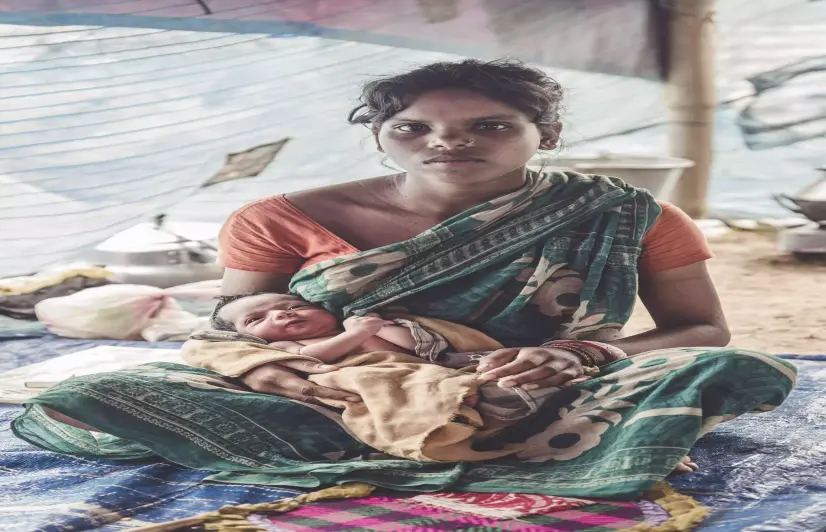How flood in Assam is forcing people to depend on rafts

How flood in Assam is forcing people to depend on rafts
Morigaon, Assam: “I was fast asleep when I heard my husband shout that there was water everywhere. By the time I was able to get out of the bed, the water had almost reached till my waist. The river had flooded everything and it felt like it was now after my dream, my unborn baby, wanting to wash it away too. I was pregnant, in shock, and I could feel my baby kicking as we started our journey to dry land,” said 23-year-old Rani, who only goes by her first name, a resident of Ahatguri, a tiny hamlet in Morigaon district.
Rani gave birth a week ago at a shelter home in Morigaon, Assam. When the floodwaters first struck her village, she was caught unaware. Her husband, Raju Shanker, quickly got her on board a bamboo raft, which was her home for over a day and a half, before she could be moved to a shelter home minutes before her delivery.
She said it was dawn when they were able to get out of their flooded home and boarded a bamboo raft. Raju loaded the raft with salvaged essentials such as food and clothes. He added that they kept living off that raft as they couldn’t find any safe space to dock it and survived on a packet of biscuits and puffed rice.
“I stayed in the raft for nearly 40 hours, writhing in pain and holding on to life for the sake of my unborn child. When we finally spotted some shelter, my husband rushed off to find some space for me,” said Rani.
She added that while thinking of the water and the flood still gives her nightmares, she is happy that her newborn is safe and smiling.
Narayan Pal’s tale is also not very different from Rani. The 42-year-old suffers from lower limb disability and when the floodwaters entered his village, he was at a farm. “People started running to save their lives but for me, mobility is an issue. Some people gave me banana stems and ropes before the situation got worse,” said Pal from Madanbari village in Morigaon district.
He hurriedly put together a raft with the help of the villagers, and that’s how he remained afloat in the water that was about five feet high, till he reached a relief camp about four kilometres away.
He keeps his raft close as it helps him move around and also go back to his house, and check on whatever little is left of it. "If it were not for this raft, I would have drowned. This has been my home, my saviour," he said.
There are several like Rani and Pal, whose lives are completely dependent on these bamboo rafts, as they have become their temporary homes, where they stock their belongings, sleep and also use it to navigate through the waters to meet relatives and also check on their homes.
Flood in Assam has claimed over 90 lives so far, and heavy showers continue to create havoc in the state. According to the Assam State Disaster Management Authority (ASDMA), nearly 88,000 people were affected by the torrential rain causing massive flooding in 10 of the 33 districts of the state.
Santanu Mishra, a co-founder of Smile Foundation, an NGO working on disaster relief management, said people from these flood-prone states like Assam, Bihar and Odisha have learned to live with disaster as they face floods every year.
He stated that they have about 100 odd volunteers working across the flood-affected states. He added that most of the local people have become adept at making these makeshift rafts in less than an hour. “Some use them as ferry boats to keep going back to their houses, while some stock their little belongings and almost live on them. Lakhs of people have moved to shelter homes but the inputs we have from our teams on the ground is that there is a sizeable population which prefers a floating existence as this enables to keep a check on their homes and surroundings,” he said.
Uttam Datta, a volunteer with Smile Foundation, said almost 80% of houses have been washed away and the schools made of brick and mortar have been flooded. The muddy waters have washed away the notebooks and float in the water alongside clanking utensils, he stated.
"Banana trunk rafts and bamboo rafts have turned into homes for people. People are living and wading through muddy waters, food grains have been washed away and people are trying to salvage whatever they can," he explained.
Himangsu Sarma, an independent photographer and a researcher, said the bamboo rafts—which the residents are using for communication, mobility, and security—are only temporary solutions as it is not practical for anyone to go on living in these forever. Many flood survivors are using these rafts to hoard their little possessions, to wade through waters to check on their relatives and friends living in other parts of the island and also to commute from the shelter homes to their lands or little of whatever is left of their homes, Sarma added.
An ASDMA official, on the condition of anonymity, told 101Reporters that repeated floods in the state over the years has taught them the know-how of how to cope with the floodwaters. ASDMA, with the contribution from NGOs, is trying to bring a semblance of normalcy in the region but it is a long battle ahead, he added.
Would you like to Support us
101 Stories Around The Web
Explore All NewsAbout the Reporter
Write For 101Reporters
Would you like to Support us
Follow Us On
